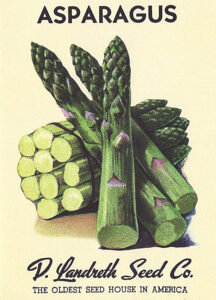For lazy gardeners like me, January is a quiet time. The garlic is tucked in for its winter nap, and a few hours of mulching work in the fall means I won’t have to think much about it until June. Once it starts waking up, I’ll plant around it with whatever pest-resistant (read: spicy) seeds I can find at the local libraries around western Massachusetts, where I live.
Back home (I’m on the Outer Cape as a winter fellow at the Independent) I take advantage of starts that are traded or given away by my more proactive neighbors. One other source: with the state’s Healthy Incentives Program, a supplement to SNAP, food assistance recipients can use their EBT cards to buy seeds or starts and have that money put right back into their accounts.

But for farmers and those gardeners who don’t mind a higher ratio of effort to yield — or who don’t even think about gardening in such terms — winter is a time for planning what to do with one’s space, ordering seeds, and starting some of them indoors.
Paula Erickson is still enjoying the 2024 crop of purple sweet potatoes she grew in a corner of her small farm in Truro. She slices the spuds in half, boils them, then roasts them cut side down in the oven and serves with salt, pepper, and butter.
That corner of her garden, by the way, only about seven feet at its longest edge, yielded 70 pounds of the colorful tubers, Erickson says.
“One of them looked like the Loch Ness monster,” she says. “I had to hold it with two hands.”

The successful experiment in a throwaway space inspired her to try for even more this year, Erickson says. She’s ordering her slips — small sections of vine with a leaf and a root attached — from Johnny’s Selected Seeds, a company based in Maine. She’s even planning to build a DIY root cellar by burying a plastic barrel, so she loses less of her crop to spoilage next year.
Dave DeWitt, who runs Dave’s Greens in Truro, is plotting some new flavors for the coming growing season — but he’s remaining tight-lipped about them.
“I always try to stay one step ahead of what everyone else is growing,” he says. “I tend to start a trend, and then once everyone’s jumped on board, I back out and start a new trend.”
DeWitt says the winter is for “farming on paper.” Some of this means looking back through his field notes from the previous year — something all farmers and gardeners should practice, he adds — and mapping out where he’ll grow everything this year, with an eye toward soil health and managing pest pressure.
DeWitt says some of the new crops he’s introducing to his farm this year are for his salad mix, which he says he’s “very well known for,” and some are root crops. He plans to erect hoop houses in his fields to extend the season a bit for some new heat-loving varieties.
DeWitt orders most of his seeds from Johnny’s and from Fedco, another Maine-based distributor, and says he’s already placed his orders for the coming season. And though it’s not where he gets his seeds, he says he was part of the push to make Truro’s public library the first on the Cape to host a seed library. Other Outer Cape libraries have followed suit.

One beneficiary of Wellfleet’s seed library is the Provincetown Independent’s Emma Doyle. A fellow lazy gardener, Doyle says she keeps perennials like asparagus and strawberries in her half plot at the Wellfleet Community Garden on the grounds at the town’s senior center. She grows arugula and lets some of it go to seed and lets some of her tomatoes fall off the vine and “volunteer” for the next season. But, she says, she likes to get starts of special tomato varieties from DeWitt.
She’s not doing a thing about that yet. Doyle says her January gardening practice is to “think about whether or not I have to think about it.”



